Individualism
Individualism
The Cultural Logic of Modernity
Edited by Zubin Meer
LEXINGTON BOOKS
A division of
ROWMAN & LITTLEFIELD PUBLISHERS, INC.
Lanham Boulder New York Toronto Plymouth, UK
Published by Lexington Books
A division of Rowman & Littlefield Publishers, Inc.
A wholly owned subsidiary of The Rowman & Littlefield Publishing Group, Inc.
4501 Forbes Boulevard, Suite 200, Lanham, Maryland 20706
http://www.lexingtonbooks.com
Estover Road, Plymouth PL6 7PY, United Kingdom
Copyright 2011 by Lexington Books
All rights reserved. No part of this book may be reproduced in any form or by any electronic or mechanical means, including information storage and retrieval systems, without written permission from the publisher, except by a reviewer who may quote passages in a review.
British Library Cataloguing in Publication Information Available
Library of Congress Cataloging-in-Publication Data
Individualism : the cultural logic of modernity / edited by Zubin Meer.
p. cm.
Papers presented at a conference of the American Comparative Literature Association held at Princeton University.
ISBN 978-0-7391-2264-8 (cloth : alk. paper)--ISBN 978-0-7391-6587-4 (electronic)
1. Individualism in literature. 2. Individualism--History. 3. English literature--History and criticism. I. Meer, Zubin, 1975-
PN56.I57I63 2011
809'.93343--dc22
2010051788

The paper used in this publication meets the minimum requirements of American National Standard for Information Sciences Permanence of Paper for Printed Library Materials, ANSI/NISO Z39.48-1992.
Printed in the United States of America
To Bashir Ahmed Sheikh
for the gift of time
Contents
Acknowledgments
Introduction: Individualism Revisited
Zubin Meer
1: Individualism in Early Modernity
| 1 | A Silence in the Family Tree: The Genealogical Subject in Heldris of Cornwalls Silence |
Julie Orlemanski
| 2 | Shakespeares Polycentric Marketplace: Why the Individual and the Community Need Not Be at Odds |
Frederick Turner
| 3 | A World of My Own Creating: Private Worlds and Social Selves in Margaret Cavendishs Blazing World |
Megan Heffernan
| 4 | Secrecy and Spies: London, 16501800 |
James Cruise
| 5 | Infectious Fictions in A Journal of the Plague Year : Defoe and the Empirical Self |
Joanne E. Myers
| 6 | The Other Side of Modern Individualism: Locke and Defoe |
Nancy Armstrong
| 7 | Lockes Disciplined Self: A Postcolonial Perspective |
Nigel Joseph
| 8 | The Tragedies of Sentimentalism: Privatizing Happiness in the Eighteenth Century |
Vivasvan Soni
2: Individualism in Late Modernity
| 9 | Unknowing: The Work of Modernist Fiction |
Philip Weinstein
| 10 | Lukcs, Bakhtin, and the Apocalypse of Self in the Modern Novel |
Jonathon Penny
| 11 | Camouflage Work: Precisionist Painting and the Hidden Subject of Modernism |
David Jenemann
| 12 | The Precarious Subject of Late Capitalism: Rereading Adorno on the Liquidation of Individuality |
Dale Shin
| 13 | The Encrypted Individual in Dialectic of Enlightenment |
Tom McCall
| 14 | The Rise and Decline of the Individual in Adorno: Exit Hamlet, Enter Hamm |
Deborah Cook
| 15 | The Individual as Cheshire Cat in Reading Lolita in Tehran |
Lisa Eck
| 16 | Re-Orienting the Human: The Esoteric Self |
Lucy Stone McNeece
Index
About the Contributors
Acknowledgments
This volume constitutes selected conference proceedings of the annual convention of the American Comparative Literature Association, held at Princeton University, 2326 March 2006, on the overarching theme of The Human and its Others. The essays in this collection belong to the five-part panel: Literature and the Sovereign Individual of Modernity.
I foremost wish to acknowledge the assistance of the ACLA, without which this endeavor would not have been possible. I would also like to express appreciation toward Vivasvan Soni and Lucy McNeece for chairing panels; Asher Horowitz and Philip Weinstein for aid in the beginning with the book proposal; Michael Sisskin, from Lexington Books, for continued patience and essential advice; Tim Reiss, whose oeuvre is central to contemporary research on indvidualism, for extraordinary graciousness and kind interest in the project; and various contributors for patiently answering all my questions and offering helpful suggestions. Special thanks goes to Jim Cruise, who has made all the differencenot only for sage counsel and mentorship but also a friendship that has sustained me these past few years more than he can know.
Introduction: Individualism Revisited
Zubin Meer
Few master-categories bear as formidable a modernist semantic freight as individualism and so perhaps a few words of initial clarification are warranted. To sketch out its broadest semantic delineations, and depending on the specific bourgeois usage in mind, individualism connotes a dynamic capitalist economic rationalityutilitarian, competitive, and profit-maximizinginimical to the supposed torpor of feudal and tribal mentality alike. It also implies a Protestant spirituality scornful of the sensuous iconicity and communal sociability of saints, relics, pilgrimages, and traditional church hierarchy. Pitched against the corporatist ethos of feudal political theory, individualism is of course also shorthand for the modern liberal sense of politico-juridical right and entitlement. And, finally, in a tonal register derived from formal philosophy, individualism is also tantamount to a creative rationalism, veridical empiricism, and intimate subjectivity, all conceived of as reactions againstas well as extensions ofthe hermeneutic authority of the classics and the Bible.
It should be apparent that even as a family of concepts, individualism, more looking-glass than lens, is inevitably over determined: we see in individualism what we want to see in it. Of course, family resemblances do obtain, and the boundaries between these diverse semantic fields have long been remarkably porous. For example, it is commonly recognized that Protestant theology on individual moral responsibility profoundly influenced the consensualism of social contract theory (which is not to say that pre-Reformation Christianity did not also play a role in the rise of a voluntarist contractualism, most notably with Thomas Aquinas and William of Ockham as well as the Church Fathers). Furthermore, although bourgeois frames of reference predominate in contemporary discussions of individualism, it should not be assumed that ideological mystifications on the right and left have not also left their mark. As improbable as it may seem nowadays, the word individualism, as we shall learn, was coined by French Catholic conservatives in the early nineteenth century, and their polemical refrains echo resoundingly down to our own day in conservative as well as socialist critiques of liberal officialdomand in fairly complex, contradictory ways. Contemporary American conservatives, to take up only the most glaringly obvious example, embrace the laissez-faire economics of classical liberalism but not the modern or social liberalism of civil rights.


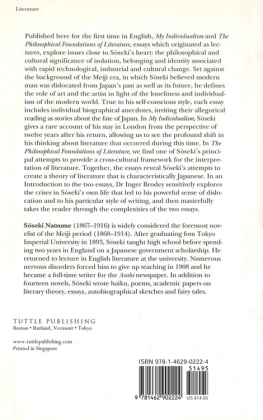

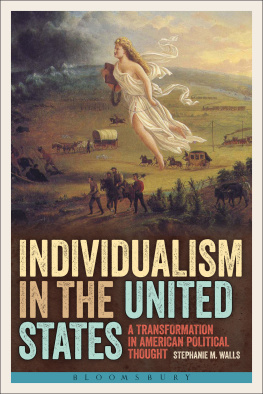


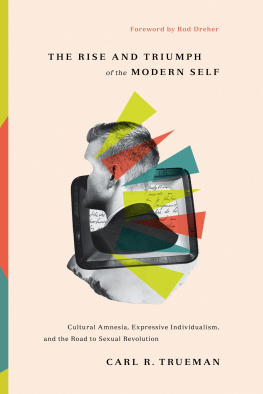
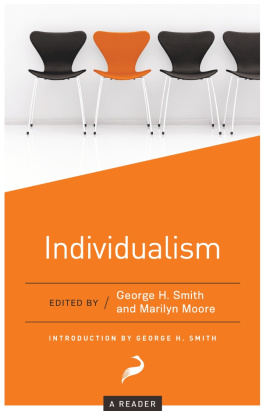
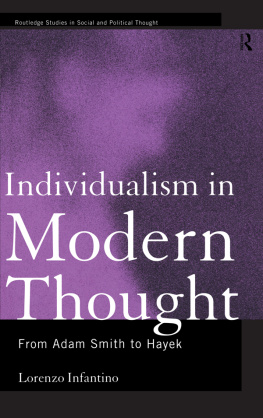
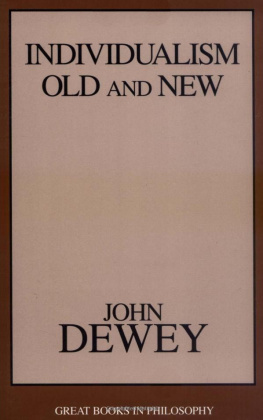
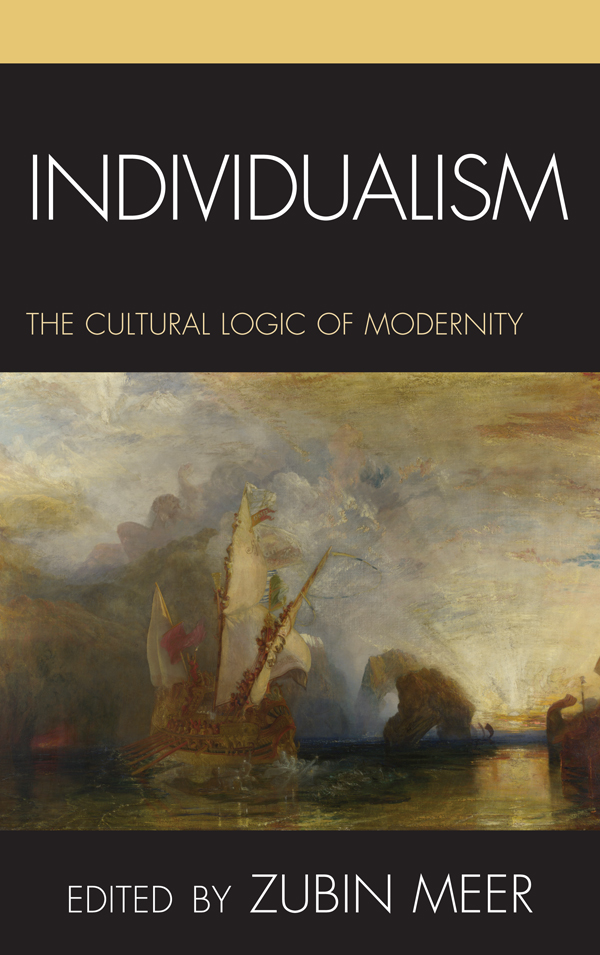

 The paper used in this publication meets the minimum requirements of American National Standard for Information Sciences Permanence of Paper for Printed Library Materials, ANSI/NISO Z39.48-1992.
The paper used in this publication meets the minimum requirements of American National Standard for Information Sciences Permanence of Paper for Printed Library Materials, ANSI/NISO Z39.48-1992.